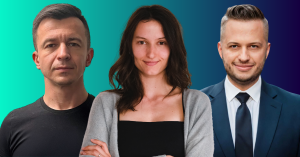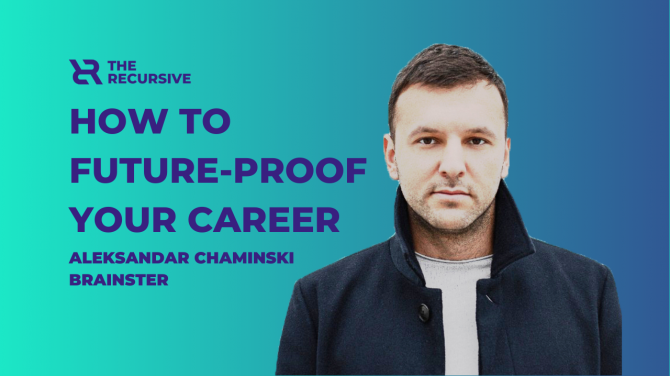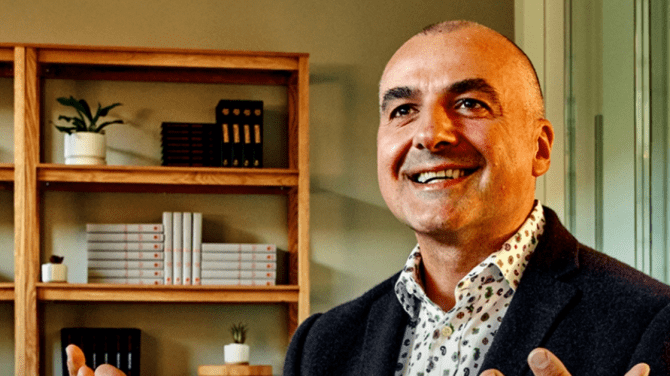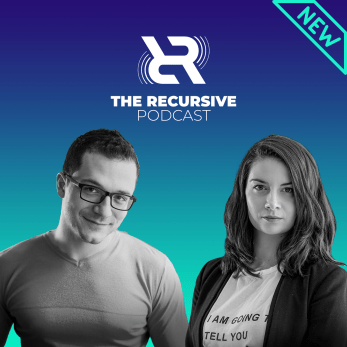Together with Sofiyska voda, operated by Veolia, The Recursive held “Corporate Venturing in SEE for Sustainable Startups” to show what is the value in incubating cleantech, greentech, and sustainability-related technologies in a corporate context.
We managed to gather like-minded individuals, corporate innovation leaders, venture capitalists, institutional representatives, and cleantech founders to discuss how corporate innovation and venture capital can combine their efforts to drive the growth of sustainable innovation across Southeast Europe.
The event featured inspiring keynote speeches by our hosts from Veolia, two insightful panel discussions, and startup pitches by seven emerging innovators. In the end, we saved some time for networking and exchanging ideas over a glass of wine.
If you are keen on the topic of sustainability, we have the entire live stream of the event recorded.
The essentials of a successful corporate-startup collaboration
The first discussion featured Francois Debergh – Country Director Bulgaria & Greece, Miroslav Gechev – Director IoT at Develiot as part of Telelink Business Services, Kaloyan Georgiev – Expert in Digitization, IoT, Automation, and Energy Management at Schneider Electric and Executive Board Member at PARA, and Katarzyna Wszola – Director of Innovation at Veolia Poland.
They highlighted that among the key elements for successful corporate-startup collaboration are scalability, resource-efficient approach, mutual understanding, and adaptability. The panelists also delved into reverse-pitching the value of such partnerships for startup founders. As Katarzyna Wszola explained, such collaborations are supporting startups in three main directions – verification of technology, access to partners for education and mentorship, and, of course, funding.
“To have a successful partnership between a big company and a startup, there should be some level of maturity for the relationship between these two players with different levels of development to work out The corporate stands in a defensive position, it has to defend markets, budgets, and customers. Startups are in an attacking position, they want to get everything. Usually, that is the reason why startups think corporates are very rigid, bureaucratic, and very slow. While on the other hand, corporate see startups as very inexperienced, naive, and impatient. Good partnerships happen when these two understand their differences and manage to work through them,” Miroslav Gechev highlighted.
It is not always easy to measure the value of innovation and corporate-startup collaboration. The startup pitches of founders who have worked with Sofiyska voda, operated by Veolia, however, showed that the impact on their growth could be presented with hard numbers.
“First, it was very important for us to receive mentorship from the management team of Veolia. They provided us with access to resources and a place to test our hives as well as financial support for our testing equipment,” Peter Petrov, co-founder of the beehive monitoring startup Sensato, said.
All in all, seven Greentech founders presented on stage and online:
- Denis Ivanov – Founder of Vodoraslo
- Petar Petrov – Founder of Sensato
- Michael Masnitza – Co-Founder and COO of ChargeX
- Nicolas Le Borgne – Co-Founder and CEO at Thermosphr
- Bilyana Nikolova – Founder of SatGeo
- Anton Petrov – Co-Founder and CTO of Gridmetrics
- Kalin Nikolov – Co-Founder of Decarbonyzer
“The value-added of having corporates, startups, and VCs in one place can be defined with one word – synergy. We have the startups with their innovative ideas, the corporates which are validating these ideas, and the VCs which are accelerating the growth of the ideas with more financial backing,” Lyubomir Filipov, Strategic partnerships director at Sofiyska voda, operated by Veolia, commented.
VC’s and investors’ uptake on ESG
The second panel “Financing opportunities for startups” featured Manyu Moravenov – Director of Bulgarian Stock Exchange and BEAM for SMEs, Pavel Velkov – Managing Partner at Morningside Hill, Victor Manev – Managing Partner at Impetus Capital, and Stoyan Nedin – Venture Partner at Vitosha Venture Partners.
“So far Vitosha Venture Parthers can brag with 10 investments which have a very clear sustainability focus, out of 55 in total. Some of them are in energy efficiency, otters in electric mobility, recycling, reusing, and waste management,” Stoyan Nedin noted.
So how is ESG integrated into the decision-making process of venture capitalists? This question sparked a debate among the panelists who diverged in their opinion on whether ESG regulations should impinge on the startup field.
“I have a special opinion about the requirement to ESG rate startups and don’t see why we should be asking a team of two people to be ESG-compliant,” Pavel Velkov said. And while Viktor Manev agreed with him, Manyu Moravenov stated that even a team of one person could become net zero and be equally focused on growing their business and impact.
Stay tuned for the after-movie with highlights from the in-person event!





